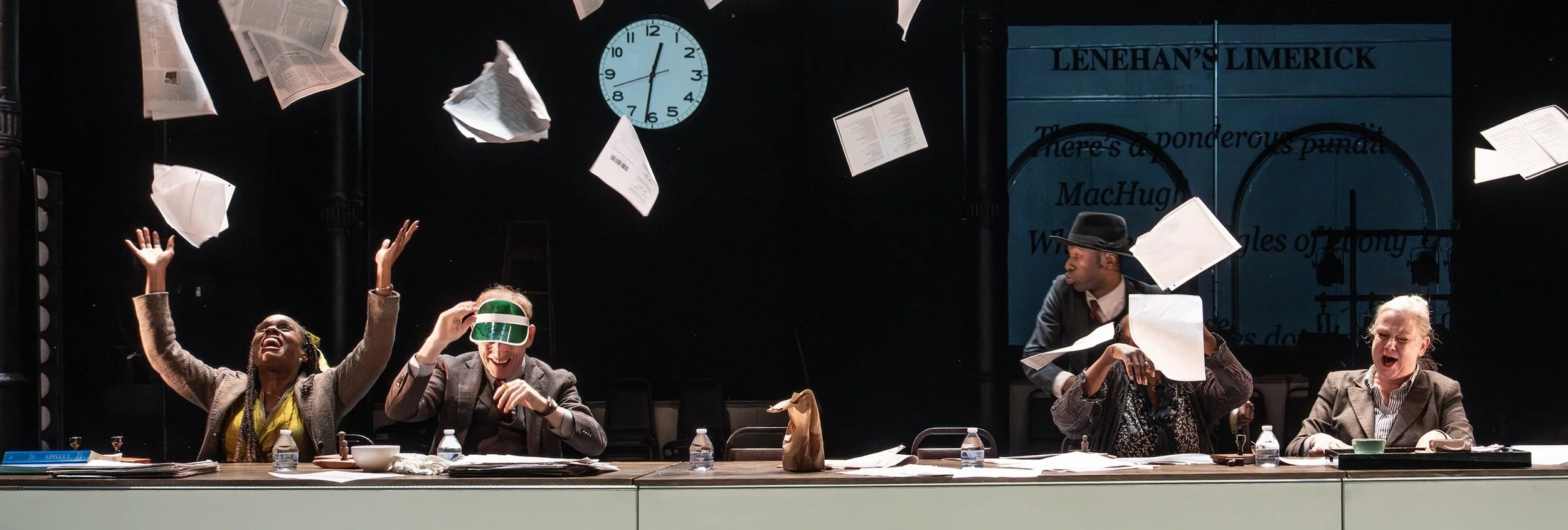In the musky glory of The Kraine Theater, the March family spits crazy rhymes and self-professedly drops beats like a smooth silk ribbon. Although jaunty violins welcome us inside, it is the quick enticement of Lil' Theatre Company's hip-hop musical that soon settles us into our seats. Lindsay Taylor and Sara Stock are the writers of Lil' Women: A Rap Musical, which was inspired not just by Louisa May Alcott's novel but also by a certain popular rap musical that sends all who see it into fits of religious praise: Hamilton. The influence is too obvious to go unnoticed—sometimes to the production's occasional weakness. In an effort to reconcile the massive success of its progenitor with its own relative obscurity, Lil' Women drops hints of its inspiration while trying to break new ground with reasonable success.
Originally from the show streets of Orlando, Taylor's production is one of the more standout shows at this year's FRIGID NY festival—she is credited as the director and producer of Lil' Women. Its concept invites apprehension and interest in equal measure: taking a beloved classic and subverting its white, all-American tradition is no easy task. Many already know the story: Meg, Jo, Beth and Amy March weather crises of faith, friendship and love as they grow up under the benevolent eye of their parents, mischievous Laurie (the boy next door) and John Brooke (his tutor). It reads like a soapy, sweet tale, promising an uncomplicated ending. But somehow Taylor's hilarious spin on the March family makes it easy to forget the all too well-known plot, and enjoy the droll, nudge-nudge moments of musical inspiration that slips and slides from the pens of Taylor and Stock.
Beth pulsates with witty energy; she isn't the dowdy, quiet angel that Alcott canonized in her book. Megan Borkes renders her active, self-aware and irrepressibly engaging. Croix Provence's Amy begins as a childish caricature of Alcott's character, but by the end of the play, she is brimming with womanly wit and charm. Even mature Meg, played by the highly entertaining Toni Bonaccorso, sneaks in some character development even as the show speeds through the plot. Her meet-cute romance with John (a disarmingly funny Gregory Coleman) is a delight to watch, and her command as a rapper, while seemingly incongruous for a dimpling redhead, is especially astonishing. But by and large, the play is carried on the very able shoulders of Rebecca Siegel, who plays the glorious spitfire that is Jo March. Siegel is perhaps the best rapper of all her sisters (although Meg might disagree; the two have a fantastic rap battle— mediated by her mother, played by writer Sara Stock—that helps the audience settle who the better rapper is), and her singing voice is quite agreeable too. Her most poignant, Jo-like moments come during her interactions with Beth, Laurie (a rib-ticklingly wonderful Adam DelMedico) and Friedrich Bhaer (played by a superb Justin Aldridge), the three most important agents in her life.
The reigning star of the show is the music: rhymes and dialogues flow seamlessly from the actors. The cast does not for a second call into question its rapping abilities. A particularly enjoyable song (and one that refused to stop playing in one's head) is "Commander in Chief" sung by Mr. March, played by the supremely talented Jason Blackwater. The partnership between Taylor and music writer Isaac Folch renders even the most mawkish episodes from Alcott's book (namely Mr. March's return from the war) side-splittingly funny. If there is one avenue where they falter, it is in the story. For a tale as often told as Little Women, it might take more than a rap musical to refresh its well-known denouements. But even as the show whizzes past key scenes (Beth's passing, John and Meg's married life, Jo's publications and Amy's brush with death), the production leaves us quite content in its attempt to refurbish a beloved story.
The costuming is subdued yet appropriate; it doesn't seem anarchic or anachronistic, as most period costumes do in intimate settings (costume is by Borkes, Siegel and Taylor). The set is an empty black box, and in some ways makes the action in front of it all the more colorful. The main star of the show, however, is the music. Hip-hop is a nascent musical medium, especially on the Broadway stage. Hamilton has made rap music palatable to the largely white, upper middle-class audiences of New York, with the same brand of spine-tingling newness that Lil' Women has successfully emulated. One could say that Miranda's juggernaut endeavor has just spawned the first (of its undoubtedly many) children, and no-one's complaining. Lil' Women, for all its overt obeisances to Lin-Manuel Miranda's genius, borrows the same penchant for envelope-pushing musical entertainment.
The last performance of Lil' Women: A Rap Musical at The Kraine Theater (85 East 4th St. between 2nd and 3rd Aves.) was March 5. As part of Orlando International Fringe Theatre Festival, Lil' Women will run from May 19-29 at the Orlando Shakespeare Theater (812 E. Rollins St.) in Orlando, FL. Tickets are $11 with the purchase of the Fringe button starting April 14 at www.orlandofringe.org.







